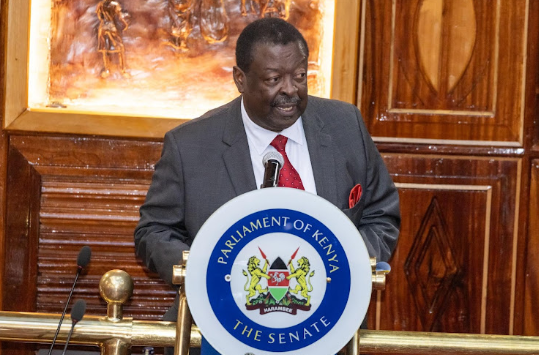Prime Cabinet Secretary Musalia Mudavadi revealed that a total of 730 deported Kenyans have been readmitted into the country since 2022. Addressing the Senate, Mudavadi noted that these individuals were deported for various reasons. Specifically, 186 Kenyans were repatriated in 2022, 378 in 2023, and an additional 166 in 2024.
“The State Department for Immigration and Citizen Services has informed that the following number of Kenyans were returned on various grounds since the year 2022,” Mudavadi said.
The Prime CS who is also in-charge of the Foreign and Diaspora Affairs ministry was responding to a question by Kisumu Senator Tom Ojienda on how many people had been deported back to Kenya since 2010.
Mudavadi affirmed that the government has a system in place to admit deportees.
He said immigration officers at the ports of entry and exit are tasked with confirming that the deportees are Kenyan nationals before they are admitted into the country.
“The Citizenship and Immigration Act sets out the criteria or protocol for admission of such persons into the country.
“This includes the issuance of travel documents, verification of identity, confirmation of citizenship, right of entry and residence among others.”
During the plenary session, Mudavadi disclosed that 316 Kenyans had passed away in Gulf States since 2022. Among these, 58 deaths occurred in Qatar, 51 in the United Arab Emirates, 25 in Iraq, 10 in Bahrain, and six in Kuwait. Notably, Oman and Iran reported no Kenyan deaths during this period.
Mudavadi stated that there are approximately 416,548 Kenyans residing in these Gulf States, although he acknowledged that the actual number could be higher due to some citizens not registering with their missions abroad.
He reassured Kenyans working in the Diaspora of the government’s commitment to safeguarding their rights and welfare.
Furthermore, Mudavadi highlighted that measures have been implemented to streamline and enforce bilateral agreements that Kenya has signed with foreign nations regarding labor and employment. These efforts are part of the government’s initiative to protect the rights and welfare of Kenyans employed abroad.
“We are working on a sessional paper that will be presented to Parliament soon, for the legislative arm to have an input on the policy, legal and institutional framework that support our bilateral negotiations,” Mudavadi said.
He said collaboration between the Ministry of Foreign and Diaspora Affairs and the Ministry of Labour is being scaled up to ensure Kenya competes favourably in the global labour migration market.
“I can give an example of the Labour migration agreement between Kenya and Germany that is close to completion being one of the more than 10 bilateral agreements we are processing as a government. This will create a system for skilled workers to move between the countries while protecting Kenyan workers’ rights,” he noted.



